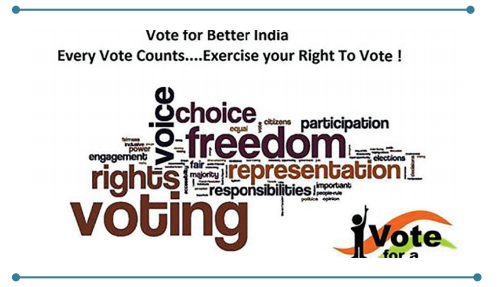Chapter: 11th Political Science : Chapter 4 : Basic Concepts of Political Science Part II
Political Obligation
Political Obligation
Do you feel or expect that the
Government must be transparent and accountable to the citizens of the nation?
If yes, then how are you reciprocating back to the Government? This is what
Political Obligation is. It is related to moral affair. Every individual has to
perform certain duties such as payment of taxes, participate in voting, perform
judicial and military functions, but for what? It is in order to maintain the
political institutions of the country.
Political obligation binds a person to the performance
of duties as mentioned in the Constitution. An individual has to follow the
rules and regulations in the society for his own welfare and the society’s
welfare. When the State is responsible towards the citizen, the citizen must
also reciprocate to the Government. The proper functioning of the State depends
upon the proper functioning of the systems of the government.
The word ‘political’ actually deals with policy and
the government’s administration. The framework of the political system is
framed and then the limitations of the power are identified.
T.H. Green states
political obligation as, “it is intended to include the obligation of the subject
towards the sovereign, the obligation of the citizen toward the state, and the
obligation of the individual to each other as enforces by the political
superior.”
Political Obligation and Political Authority
When the state has a political authority, it has
the right to compel the non-compliers. For example if anything within the
State’s authority to levy the taxes, then the State has all the rights to
compel the non- compliers to pay the taxes. However, even if the State does not
enforce its authority, still it is the moral duty of the citizens to comply
with the laws.
Hence, every human being is
subject to political obligation owing to the omnipresence of the modern nation
state. Political obligation otherwise involves three major aspects:
The identifiable authority to which political obligation is
rendered: If a person has an
obligation to do or refrain from doing, he has to be directed by a person who
has the authority or the power to direct or instruct. However, a person’s
political obligation has a certain link to the citizenship of the state. A
foreigner will not have political rights but will have legal obligation and
protection.
To what extent political obligation can be rendered: The State can enforce laws and expect minimum obligation.
This means that the people cannot be selective about the laws but have to obey
the laws. Examples to quote can be voting, military duty, etc. These are the
basic duties of the citizens which have to be compulsorily implied without
being selective.
The basis of Political Obligation: Political obligations have gained momentum only after the
sixteenth century. Earlier, the people considered Political obligation as the
will of God. But, modern political theory differs in its explanation. This
theory says that no person is forced to do a work but they voluntarily assume
their own duties as their valid obligations.

Do you know why the people assume in such a way?
The reasons are self-interest and realisation of the state’s basic duties. The
State is providing the people with physical safety and security. People are
aware that securing justice or maximizing happiness cannot happen without the
political authority. When these are provided by the state, naturally the people
are responsible for political obligations.
Features of Political Obligation
·
There prevails a source of
political spirit and social service
·
Honesty and integrity are the
essential aspects when it comes to the performance of public duty.
·
There must prevail political
legitimacy and effectiveness
·
The citizens also have the
responsibility of guarding their guardians
Let us think over the kinds of Political Obligations
Political Obligations are of four
kinds. What are they?

Moral Obligation: Are you hospitable to the guests who come to your house? Do you help the poor? Will
you not take care of your parents in their old age? These are your moral
obligations. They do not legally bind the community and the individuals and if
you do not behave within the moral obligations, you can also not be
punished. However, this is your ethics and moral principle innate in you.
Legal Obligation: Our nation is a welfare state where the Government focuses on providing us with
the infrastructural facilities. Roads, health centres, hospitals, education,
etc are few of the examples of concern.
Positive Obligation: There are certain rules made by the state which cannot be
disobeyed and hence they are considered as the positive obligation. Can you
think of some examples related to positive obligations? Yes, paying tax and
serving the defence are some of the examples under positive obligation.
Negative Obligation: This is the direct opposite of positive obligation. Here,
an individual is not permissible to do what the government prevents him from
doing so.
Which are your obligations to the state?
·
Playing with your
friends.
·
Cast votes during the
election time.
·
Teaching your
sister.
·
Payment of taxes to
the state.
·
To join the Public
Service.
·
To serve the army
during emergency time.
Now, think of some examples under negative
obligation. Have you seen some people get drunk and behave in a very disorderly
manner? Some drink and drive, some of them cause a lot of problems to the
family after being drunk. In the same way, commission of crime is also a
negative obligation. Hope, you understood what negative obligations are?
The Constitution and important obligations
The Constitution is considered as a rule book of
the state and it expects the citizens to adhere to the rules. If the
Constitution has to work successfully, then people’s cooperation is also a
must. “Law is a means to an end and never an end to itself ”. There is a
concept called the steam roller legislature. In case a law does not serve good
then it has to be changed. There are situations where some laws are framed by
the Government which are harmful and yet they get a support, which is called
the Steam roller legislature. It is the duty of the citizen to resist such laws
too. Hence, the concept of political obligation not only informs people to obey
the rules and regulations of the authority of power but also informs to resist
if the laws are found not to be good for the society.
Theories of Political Obligation
All of us have some theories, values in life. We
practise whatever is right and do not follow misguiding principles. In the same
way, theories are applicable for political obligations too. There are different
types of theories of political obligation:
i. The Divine theory
In the olden days, people thought that the God
created the state and the king was his representative. But this theory could be
popular only during the ancient and middle ages but not during the modern era.
ii. The Consent Theory
This theory proposes that the authority of the
state is based on the people’s consent. Hobbes,
Locke and Rousseau justified
this theory on the grounds that the
authority of power was dependent on the people’s consent. But, later it could
not be accepted because it treated state as an artificial organisation.
iii. The Prescriptive Theory

This theory states that the respect to the
political authority is based on the principle of customary rights. It is a fact
that political institutions are continuous from the past, this ideahas been
supported by Edmund Burke. But over a period of time, it
lost its effect due to its
overemphasis on the respect for the well-established practices.
iv. The Idealistic Theory

This theory regards man and the state as two
entities. “Man” is regarded as a political and rational creature while “state”
is considered as a self-sufficing community. This idealistic theory propounds
that when the individual receives his rights from the state, he can have no
rights that can conflict with the state. However, this theory proved to be
quite abstract and which could not be understood by man.
v. The Marxian Theory
The Marxian theory is actually different from the
other theories. It has been classified into three stages:
Pre - revolutionary stage- This stage explains
political non-obligation
Revolutionary Stage- It is an eventual change from
political non- obligation stage to a stage of total political obligation.
Post- revolutionary stage-This stage is a complete
transition from total political obligation to social development.
The Marxian theory of politics explains the state
as an instrument of power in the hands of the proletariat. Towards the success
of the revolution to consolidate the socialist order, it may lead to what is
called as ‘withering away’ of the state. However, this theory was also
considered to be illogical since it made man subservient to the state.
Why should we obey the state? Is it necessary?
Though the theories mention about the political
obligation, yet some seem to be abstract while some are illogical too. But,
have you ever thought why should we obey the state? Is it because you fear or
you have a sense of patriotism? Shall we see, what are the reasons that make an
individual to obey the state?
i. Fear of Punishment:
Do you fear being punished by your teacher with an imposition if you go to school with an incomplete homework? Does your father obey the traffic signals properly fearing being penalised? Yes, fear is always there if we do not perform our tasks properly. In the same way, individuals perform their functions fearing punishments. In other ways, it is actually the coercive authority of the state that compels a man to conform to the system of regulations.
ii. Patriotism:
Why do we stand up
for our National Anthem? It is because of
patriotism. We love our nation. Hence, to keep our surroundings as well as to
keep the streets and roads garbage free is also our duty. So, the members of
the state are conscious about the state they live as without that they cannot
live as civilized human beings. The members develop a binding towards the
state.
iii. Fear of disorder and anarchy:
Do you like
your house to
be run in a disorganised manner? Imagine you have
breakfast in the afternoon everyday and the clothes are strewn here and there.
Would you like if your place is unclean? We don’t. It is a general principle
that human beings always wish for peace and order. They not only obey the laws
but also look upon the ones who do not obey.
iv. Habits and traditions:
We are all brought about to follow good habits
like being courteous, honest, discipline and obedient. This is what our
traditional values instilled. Hence, in a nation, even the citizens wish to
establish good traditions, and obedience to the state, that which becomes a
habit.
Therefore, let us understand that political
obligations are necessary for the citizen to maintain a good system nationwide.
Every individual hence has to abide by the laws for a good reciprocation from
the state as well.
Related Topics